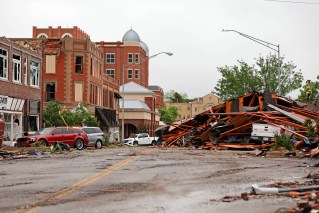Intense. Prolonged. Record-breaking. Unprecedented. Abnormal. Dangerous.
That’s how the US National Weather Service has described the historic heat wave that is hitting the country’s Pacific North-West, pushing daytime temperatures into the triple digits and breaking all-time high temperature records in places where many residents don’t have air conditioning.
Oregon’s largest city broke its all-time heat record on Saturday (local time) – and was tipped to do it again on Sunday.
Forecasters say many Pacific North-West communities may sweat through the hottest days in their histories as temperatures soar during a heatwave that has sent residents scrambling for relief.
Stores sold out of portable air-conditioners and fans, hospitals cancelled outdoor vaccination clinics, cities opened cooling centres, baseball teams cancelled or moved up weekend games, and utilities braced for possible power outages.
Portland, Oregon, reached 42.2 degrees on Saturday afternoon, according to the National Weather Service. The previous heat record for Oregon’s largest city was 41.7 degree, a mark hit in 1965 and 1981.
Seattle reached 38.3 degrees on Saturday, making it the hottest June day on record and only the fourth time in recorded history the usually temperate city had topped 100 degrees Fahrenheit.
The forecast was for even hotter temperatures on Sunday and Monday. Many all-time heat records could be broken. In Seattle, the highest temperature yet seen was 39.4 degree in 2009.
Other cities and towns from eastern Washington state to Oregon were also expected to break records, with temperatures in many areas likely to top out well above normal.
The heatwave has also moved into Idaho, where temperatures above 38 degrees were forecast in Boise for at least a week from Monday. Ontario, Oregon – a city near the Idaho border – could have a similar week, including a high of 42.8 degrees on Wednesday, forecasters said.
That’s dangerous for a region accustomed to mild weather, and where many don’t have air-conditioning.
The extended “heat dome” over the Pacific North-West was a taste of the future as climate change reshaped weather patterns worldwide, said Kristie Ebi, a professor at the University of Washington who studies global warming and its effects on public health.
“We know from evidence around the world that climate change is increasing the frequency, intensity and duration of heatwaves. We’re going to have to get used to this going forward,” she said.
James Bryant, a Seattle resident, picked up an air-conditioner in anticipation of the extreme heat.
“My house is already hot, and so with the added heat over the next few days, I’ve got kids. I got to make sure they don’t get too hot as well,” Bryant said.
“It seems to be a trend … So I’m not sure what’s driving it, but it’s not fun, that’s for sure.”
About 3000 athletes were scheduled to participate in an Ironman Triathlon in Coeur d’Alene in Idaho, on Sunday.
Race organisers said they had 28,000 kilograms of ice at hydration stations, misting stations and chilled towels to hand out to athletes, KHQ-TV reported.
The Coeur d’Alene Fire Department brought in extra firefighters and paramedics because they usually see extra dehydration calls during the event. They bumped their crews up from 17 to 60, KREM-TV reported.
The National Weather Service in Coeur d’Alene said this week’s weather would “likely be one of the most extreme and prolonged heat waves in the recorded history of the Inland North-West”.
“Unprecedented heat will not only threaten the health of residents in the Inland North-West but will make our region increasingly vulnerable to wildfires and intensify the impacts of our ongoing drought,” it said.
The high temperatures are forecast to move into western Montana from Monday.
-with AAP








